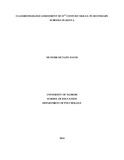Classroom-based assessment of 21st century skills: in secondary schools in Kenya
| dc.contributor.author | Munyiri, David M | |
| dc.date.accessioned | 2014-12-09T11:41:55Z | |
| dc.date.available | 2014-12-09T11:41:55Z | |
| dc.date.issued | 2014 | |
| dc.identifier.citation | Degree of Masters of Education in Measurement and Evaluation,School Of Education Department Of Psychology | en_US |
| dc.identifier.uri | http://hdl.handle.net/11295/76886 | |
| dc.description.abstract | The research project was carried out to examine teacher practices regarding ―assessment as integrated in the learning that follow 21st century thinking. This is process that transcends traditional behavioral approaches of learning that leads to transformational skills of learning. Assessment is a key component of teaching and learning process (Goodrum; Hackling and Rennie, 2001). It is through assessment that learning is communicated and articulated learners. This study addressed four objectives; a. To determine knowledge and understanding of 21st Century concepts and practices by teachers. b. To find out the types of tests used to assess learning in the 21st Century perspective towards transformative assessment. c. To find out the nature of examinations applied in secondary schools and their appropriateness to the 21st Century learner performance. d. To determine the extent to which testing desirable 21st century skills is feasible. The study adopted descriptive survey design. Stratified random sampling and purposive sampling were used to select the sample from the target population. Data was analyzed using descriptive statistics. The main finding of the study was that teachers lack the skills and knowledge to adjust the traditional assessment skills to alternative assessment skills that would address the needs for the 21st century learning. The shift desired is from traditional measurement theory approaches to assessment that embraces critical thinking and awareness. Teachers are yet to adjust as well. The assessment teaching and assessment practices reflect those of traditional education theorists which is not appropriate in the current education thinking that embraces 21st Century thinking. This study brings to the surface and shows evidence of education practice that requires thinking through and re-addressing the pertinent issues that are necessary if learning is to be productive in the current dispensation. The study is therefore useful to policy makers as well as educators more so assessment practitioners. Recommendations are made to have the education system reviewed and current thinking integrated across all levels of what pertains to education psychology as a practice and a tool in reforming education. Education assessment that addresses 21st century skills and practice is key to this transformation | en_US |
| dc.language.iso | en | en_US |
| dc.publisher | University of Nairobi | en_US |
| dc.title | Classroom-based assessment of 21st century skills: in secondary schools in Kenya | en_US |
| dc.type | Thesis | en_US |
| dc.type.material | en_US | en_US |
Files in this item
This item appears in the following Collection(s)
-
Faculty of Education (FEd) [5979]

